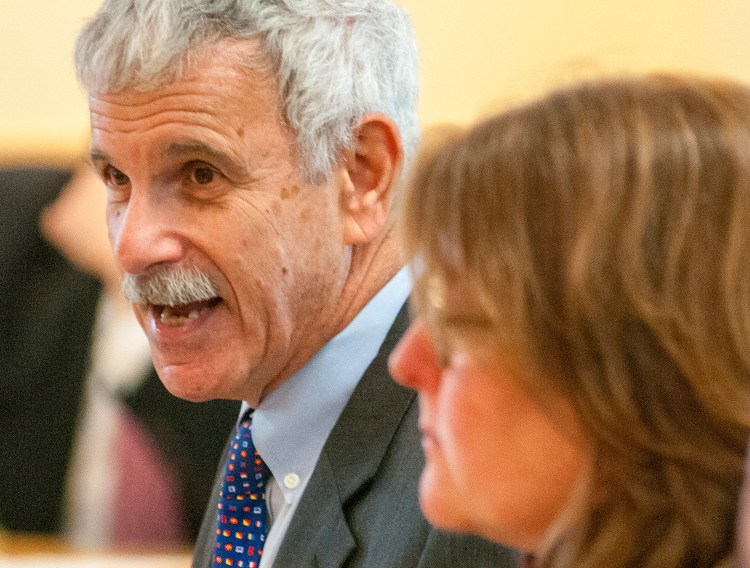State lawmakers want a proposed advisory commission to consider ways to standardize, coordinate and integrate Maine’s medical and adult-use marijuana programs.
The committee tasked with overhauling the Marijuana Legalization Act hopes this will satisfy Gov. Paul LePage’s concerns about potential inconsistencies in the tax rate and regulatory structure of this new market, which voters approved at referendum in 2016; and the existing state medical program, which has been around since 1999 and was fully implemented in 2009, said Sen. Roger Katz, R-Augusta, the committee’s Senate chairman.
“We want to make sure the two markets are as coordinated and as consistent as they can possibly be in areas where consistency is warranted,” Katz said after a Friday committee meeting. “The most important thing we did today is to charge the advisory committee we’re creating to look for ways to coordinate these programs, especially in areas like testing, packaging and labeling. That was a real step in trying to satisfy some of the governor’s concerns.”
The inconsistency between the medical and adult-use marijuana programs is just one of the reasons LePage cited last November for refusing to sign the marijuana committee’s first implementation bill. Others included the obvious conflict with federal law, which still considers marijuana illegal and in the same category as heroin or cocaine, unrealistic implementation deadlines and the potential impact on traffic safety, violent crime and youth addiction.
This draft adult-use bill calls for creating a Marijuana Advisory Commission that would review the laws and rules of the adult-use and medical marijuana industries at least once a year. Its 19 members would come from state regulatory agencies, the Legislature, adult-use and medical cannabis industry, public health organizations, a statewide municipal organization, and local law enforcement. The panel would submit reports and recommendations to the Legislature each year.
Many medical marijuana caregivers and patients oppose any attempt to consolidate the medical and adult-use cannabis programs. Some fear an eventual merger of the programs, or eventual elimination of the medical program. Others say it could lead to a single tax rate, which would raise the cost of medical marijuana, which a majority of patients must pay for out of their own pocket. Others say it is simply wrong to regulate medicine the way one regulates an intoxicant.
But LePage is worried about the intersection of the two programs. In his veto letter, he pointed out that the number of registered medical marijuana caregivers has gone up significantly since voters approved recreational marijuana. LePage claims they have been exploiting loopholes in medical marijuana regulations to broaden the sales base of medical marijuana, which at 5.5 percent or 8 percent has a much lower tax rate than the 20 percent proposed for recreational.
“The two programs must be considered together,” LePage wrote in his Nov. 3 veto letter.
At a Tuesday public hearing, Katz told anxious medical caregivers and patients that the committee did not have the desire, time or authority to merge the two programs or abolish the medical one. But on Friday, Katz said there might be areas where an advisory commission full of subject matter experts may recommend standardization, coordination or integration of the two programs, such as testing, labeling and packaging standards.
The medical marijuana program is under intense scrutiny right now as regulators implement new rules to crack down on caregivers, and lawmakers consider a raft of new bills that propose wholesale changes to how the program operates, with some giving caregivers more freedoms and others calling for a temporary moratorium on giving out new caregiver licenses until some of the loopholes that LePage cited are closed.
The adult-use legislative committee is trying to move quickly on its implementation bill, but it won’t be able to get a vote, much less LePage’s signature, before its Feb. 1 deadline. Last year, when faced with a citizens initiative law that it thought needed work, the Legislature voted to delay all the commercial aspects of the law until Feb. 1, although the section that allows personal possession of up to 2.5 ounces of marijuana went into effect immediately.
Katz has introduced a new bill to push the deadline to May 1, which would give the committee more time. The committee will hold a hearing on that extension on Friday.
Penelope Overton can be contacted at 791-6463 or at:
poverton@pressherald.com
Twitter: PLOvertonPPH
Copy the Story LinkSend questions/comments to the editors.




Success. Please wait for the page to reload. If the page does not reload within 5 seconds, please refresh the page.
Enter your email and password to access comments.
Hi, to comment on stories you must . This profile is in addition to your subscription and website login.
Already have a commenting profile? .
Invalid username/password.
Please check your email to confirm and complete your registration.
Only subscribers are eligible to post comments. Please subscribe or login first for digital access. Here’s why.
Use the form below to reset your password. When you've submitted your account email, we will send an email with a reset code.